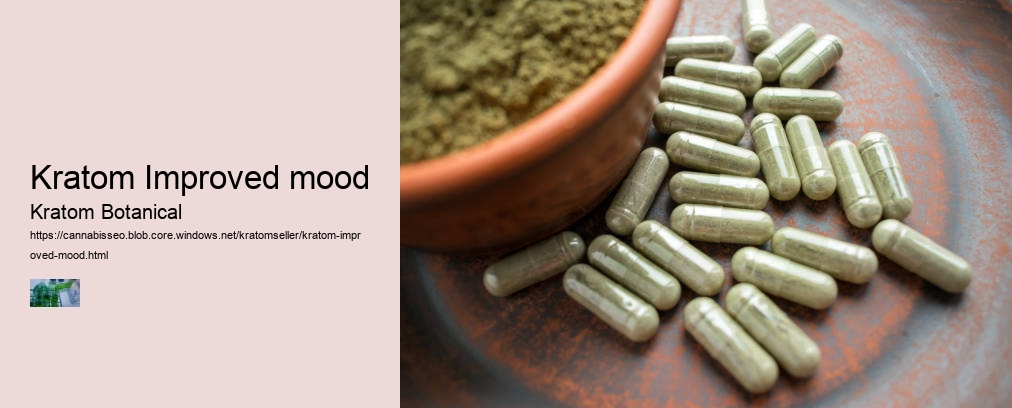

Kratom, a natural herb derived from the leaves of the Mitragyna speciosa tree, has been gaining popularity for its reported mood-enhancing effects. But what exactly is the science behind how Kratom interacts with the brain to improve mood?
When Kratom is ingested, its active compounds - mitragynine and 7-hydroxymitragynine - bind to opioid receptors in the brain. These receptors are involved in regulating emotions, including mood and stress levels. By binding to these receptors, Kratom can help regulate neurotransmitters like serotonin and dopamine, which play key roles in regulating mood.
Additionally, Kratom also interacts with other neurotransmitter systems in the brain, such as adrenergic and dopaminergic pathways. These interactions can lead to increased energy levels, focus, and feelings of well-being.
It's important to note that while Kratom may have mood-enhancing effects for some individuals, it can also have side effects and potential risks if misused or abused. It's always recommended to consult with a healthcare professional before using Kratom or any other supplement for mood improvement.
In conclusion, the science behind how Kratom improves mood lies in its ability to interact with various neurotransmitter systems in the brain. By modulating these pathways, Kratom may offer some individuals relief from symptoms of anxiety and depression. However, more research is needed to fully understand the mechanisms underlying Kratom's effects on mood regulation.
Kratom has been a game-changer for so many people, including myself. I used to struggle with my mood, feeling down and anxious on a regular basis. But ever since I started incorporating Kratom into my daily routine, I've noticed a significant improvement in my overall well-being.
I wake up feeling more refreshed and energized, ready to tackle whatever the day throws at me. My anxiety levels have decreased, allowing me to approach stressful situations with a sense of calm and clarity. Even my friends and family have noticed a difference in my demeanor – I'm more positive, outgoing, and just generally happier.
It's not just me either – I've heard countless personal testimonies from others who have experienced similar improvements in mood with Kratom use. It's amazing how something as simple as a natural plant can have such a profound impact on our mental health.
Of course, everyone's experience with Kratom is unique, and it may not work for everyone. But for those of us who have found relief in its benefits, we are grateful for the positive changes it has brought into our lives. So if you're struggling with your mood and looking for a natural way to lift your spirits, consider giving Kratom a try – it might just be the solution you've been searching for.
Kratom, a plant native to Southeast Asia, has gained popularity in recent years for its potential mood-enhancing effects. While many users report positive experiences with Kratom, it is important to be aware of the potential risks and side effects associated with its use.
One of the main risks of using Kratom for mood enhancement is the potential for addiction and dependence. Kratom contains alkaloids that act on the same receptors in the brain as opioids, which can lead to physical dependence and withdrawal symptoms when used regularly or in high doses. It is important to use Kratom responsibly and avoid developing a dependency on it.
Another potential risk of using Kratom is the possibility of experiencing adverse effects such as nausea, dizziness, constipation, and insomnia. Some users may also experience increased heart rate or blood pressure when taking Kratom, which can be dangerous for those with underlying health conditions. It is important to start with a low dose of Kratom and monitor how your body reacts to it before increasing your intake.
In addition to these potential risks, there is also limited research on the long-term effects of using Kratom for mood enhancement. It is unclear how prolonged use of Kratom may impact mental health or cognitive function over time. As such, it is important to approach the use of Kratom cautiously and consult with a healthcare professional if you have any concerns about its safety.
In conclusion, while Kratom may offer some benefits for mood enhancement, it is essential to be aware of the potential risks and side effects associated with its use. By using Kratom responsibly and being mindful of how your body responds to it, you can minimize the likelihood of experiencing adverse effects while still enjoying its mood-boosting properties.
Kratom, a herbal supplement that has gained popularity in recent years as a mood enhancer, is a topic of much controversy and debate. While some people swear by its ability to improve their mood and overall well-being, others are concerned about its legality and potential negative side effects.
The legality of Kratom varies from country to country, with some places banning its sale and use due to concerns about its addictive properties and potential for abuse. In the United States, it is legal in most states but is classified as a Schedule I controlled substance in a few states.
Despite the legal uncertainty surrounding Kratom, many people continue to use it as a natural alternative to traditional mood-enhancing medications. Supporters of Kratom claim that it can help alleviate symptoms of anxiety and depression, boost energy levels, and enhance focus and productivity.
However, critics argue that more research is needed to fully understand the potential risks and benefits of using Kratom as a mood enhancer. Some studies have suggested that long-term use of Kratom may lead to dependence and withdrawal symptoms.
In conclusion, while Kratom may offer some people relief from mood-related issues, it is important to approach its use with caution and be aware of the potential risks involved. As with any supplement or medication, it is always best to consult with a healthcare professional before incorporating Kratom into your daily routine.